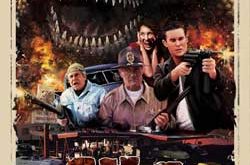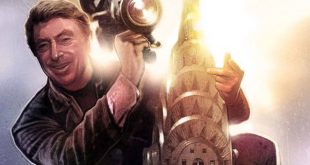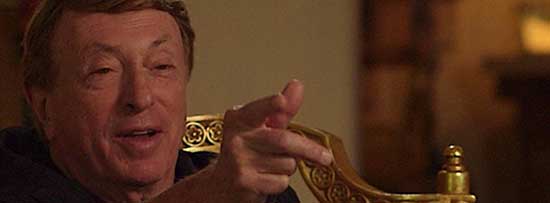 Steve Mitchell is brilliant. I was honored to do this interview. I was in a parking lot near a train of all places so listening and hearing the sounds of the train and yet learning so much from Steve Mitchell. He is a brilliant writer and so talented. He wrote and directed “King Cohen” so check out the interview for Horrornews.net
Steve Mitchell is brilliant. I was honored to do this interview. I was in a parking lot near a train of all places so listening and hearing the sounds of the train and yet learning so much from Steve Mitchell. He is a brilliant writer and so talented. He wrote and directed “King Cohen” so check out the interview for Horrornews.net
Hi Steve, It is an honor to speak with you. Please tell us how “King Cohen” manifested?
Steve- I was checking out Larry’s IMDB page. I am a fan of Larry’s and I am aware of a lot of his work but I think that day I was surprised about how much of his work that I didn’t know. I was producing DVD special features and stuff like that at the time, primarily for Image Entertainment. I had been thinking about doing my own project and I think it was one of those things where the notion based on Larry got into my head and I said, maybe there is a movie here. Sometimes you get ideas and they come and they go but this one didn’t go away. Getting financing for a movie, in case you don’t know is like climbing a mountain. The old days of Hollywood if you had an idea you could go someplace. These days it is a little more difficult.
What was it like working on “King Cohen” and what was the process of making the documentary?
Steve- Well, you know I don’t know if you know anything about how you make documentaries?
A little bit. Yes.
Steve- There is no script. You have to sort of assemble your cast. I had to go and call Larry up and say, how do you feel about a movie being made about you? He was very flattered and he said he would help in any way he could. It took a while to get the movie financed and then I went back to him and said, okay we are ready to go. And so then you have to create a huge amount of questions, especially for Larry. I had a lot of questions for the other people that were in the movie but mostly for Larry. I had pages and pages of questions because I am covering the guy’s life and his career. We had somewhere between fifteen and twenty hours of interview footage on-camera footage with Larry alone. I forget how many people we actually talked to but I probably had between somewhere in the vicinity of another twenty five hours give or take of material with the rest of our “cast.” Somehow what you do is you try to ask the most interesting questions to cover all the bases.
Then you have to give it shape and form and create narrative. For me compared to getting a movie financed, it’s relatively easy. There is a lot of trial and error. The one thing I knew I had was at the spine of Larry’s career. From his beginnings to as a stand-up comedian and then eventually working in live TV in New York. What my editor and I tried to accomplish was to use sort of each facet of his career to reveal something about who is Larry is. What we are doing is creating a tapestry that is essentially a biography of who this guy is. The anecdote are great but it goes to who Larry is. You asked what it was to be in the middle of it. My editor would start laughing because I usually have a couple of breakdowns when we do these things. I always feel like Tom Hanks in “Castaway” when he gets to that crossroads. You just don’t always know exactly where you are going to go. My mantra is we’ll figure it out. Ultimately it prevailed. It takes time. We figured it out.
What would you like to say to the audiences that will be watching “King Cohen?”
Steve- What would I like them to know? I think they are going to get to know Larry. Get to know Larry, get to know his approach. This is something that changed us when we were cutting is that he represents a kind of filmmaking that we don’t really have anymore. Martin Scorsese said he represents a renegade spirit.
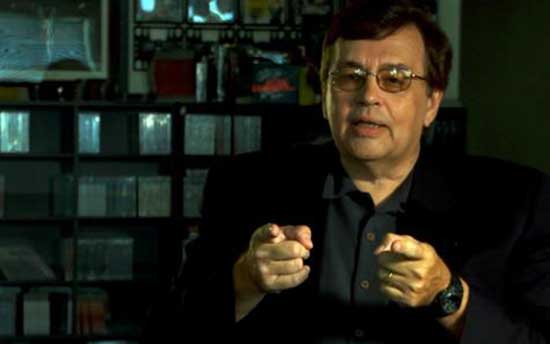 I wanted to ask you about the discussions and how the process worked talking with Martin Scorsese, Joe Dante, Rick Baker and even Larry? Especially because it is a documentary?
I wanted to ask you about the discussions and how the process worked talking with Martin Scorsese, Joe Dante, Rick Baker and even Larry? Especially because it is a documentary?
Steve- We approached Larry and we wound up doing I think four sessions with him. I watched all of his pictures. I watched the television stuff that I could get my hands on. The whole thing was who could we get that has worked with Larry. And then you go out and request the interviews. Usually when people agree they will carve out some time and I go in there and ask them between twenty and thirty questions. Part of the job of any interviewer is you ask a question and then you get an answer and you go oh really? Then why did you do it when it was raining as opposed to during sunshine? The follow-up is sometimes a very important component. Michael Moriarity wanted to see the questions beforehand. We had to travel to interview Moriarty so we wanted him to be comfortable with the questions. He agreed to the interview and he was a likable guy. I didn’t talk to Martin Scorsese in-personally. We had been chasing him for about four or five months. He was about ready to go to Taiwan to shoot, I think “Silence.” He suggested send me the questions and I will have one of my guys shoot it. We used most of what he says. I don’t remember exactly what the running time was on the material. He was very gracious and he really wanted to do this. People ask me what was it like working with Scorsese and my answer is, I don’t know. All I know is that he was very gracious with his time especially since he was about to leave the country. Other than that, most people were on one stage. We would either go to them or they would come to us. I tried to make it as simple and relaxing as possible.
I sort of cannot imagine making this film without everyone having so many questions for one another. I would ask you a million questions and everyone involved but with everyone in different places, different time frames. It must be complicated.
Steve- At different times too.
Yes
Steve- Yeah and it’s not like we go to some place and everyone is sitting in a chair waiting to be talked to. We did have one or two days where we used a store called Creature Features here in Burbank, CA which was our set. The guy who owns it was closed on Mondays. It gave us lots of interesting material for the background and the frame. I am always interested in a different frame. What was nice about it was that one day we had six people come in. It made our lives a little easier. It really is hunting and gathering. You get to a point where you feel you’ve got enough material and you just start to cut. It is not rocket science but it is a certain kind of process.
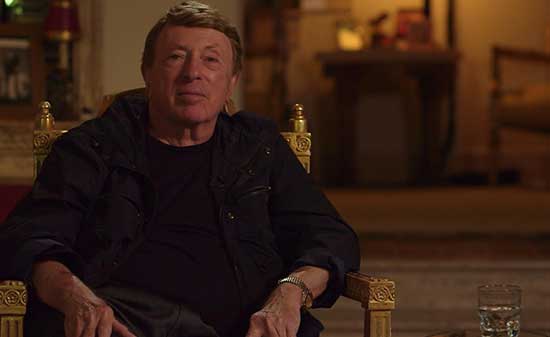 It seems it can be tedious trying to piece everything together.
It seems it can be tedious trying to piece everything together.
Steve- Yes, it can be. It can be a little tedious. We had so much raw footage to go through and good stuff. We got a lot of really great material. This movie was for me a portfolio piece. This was my first documentary feature.
Steve, because you did write and direct “King Cohen”, did you find it was more challenging because it is a documentary?
Steve- You know I think every project is challenging. It was challenging for me because of the amount of people I had to get and that I had to talk to and the images I had to kind of wrangle. I am going to tell you something and this is going to sound… But compared to getting a picture financed and dealing with the business part of show business, making a movie was relatively simply. It is not easy but for me especially doing documentary stuff. It is just challenging and it is fun.
Was it an overall good experience for you?
Steve- It was. It was a great experience. Part of it was Larry for starters. Getting to meet him and getting to know him. He is a far more interesting person than I actually could have imagined. My producing partners. I know this is a shout-out but they deserve it. My producing partners who basically got the picture made in terms of financing. They took a leap of faith on me.
What advice do you have for writers that may be afraid to start writing?
Steve- My advice is one way or the other find a way to get something done. Whatever you do get a first draft. All really great writing comes from the re-writing. You just somehow, some way believe in the idea and believe in the characters. Find a way to get from point A to point Z. Trust that you didn’t get everything in the first draft and it is tough to get started. The goal is really to get that first draft. That is a big deal. That is my advice to anybody that wants to write. Believe in yourself and believe in your idea. I will give you one piece of information that I got from a film writing seminar and I never forgot it which was at the time I took it the teacher who was a very established writer/producer. He said the purpose of the script is to make a movie star feel good. To translate that means a great character is a great script and actors love great parts. It is about the actors. Robert Downey Jr. found in “Iron Man” a great part for himself.
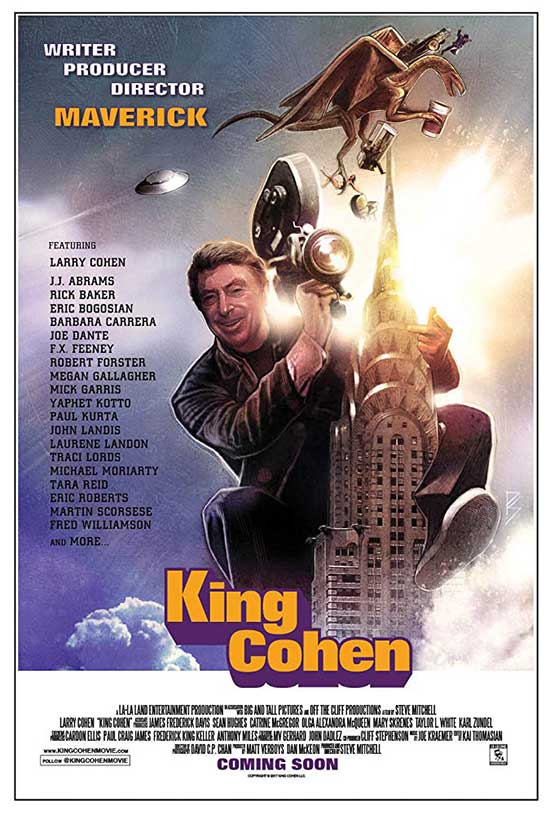 I agree, he plays “Iron Man” so well and he owns it!
I agree, he plays “Iron Man” so well and he owns it!
Steve- He is successful and he owns it.
I think that is probably some of the best advice I have ever heard. I have been writing and published since second grade so that means a lot.
Steve- Good for you!
Thank you! I think one of the best compliments I’ve received after writing a story was having people tell me that they felt like they were there with me in the story.
Steve- Obviously you pulled them into your world.
This has been an honor because you are one of my favorite writers and I do not get nervous but when you speak with someone that has inspired you means a lot so thank you. The way you create and create a character you feel everything.
Steve- Well, I am deeply flattered by that. I am also the audience and you are also the audience. I want to be absorbed in the movie. I always re-read my stuff before I send it out. And really good stories are efficient.
This has been an honor. I thank you so much.
Steve- It was my great pleasure and I am glad you enjoyed the movie. Thank you. Nice chatting with you.
Thank you Steve.
 Horror News | HNN Official Site | Horror Movies,Trailers, Reviews
Horror News | HNN Official Site | Horror Movies,Trailers, Reviews
